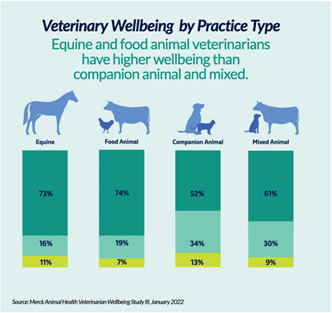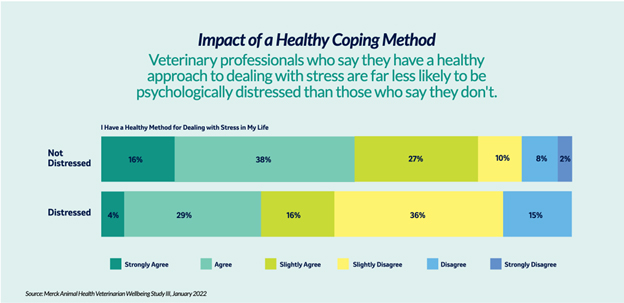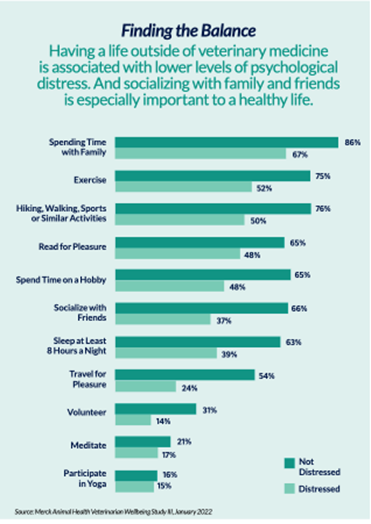RESULTS FROM THIRD STUDY ON VETERINARY WELLBEING
Merck Animal Health recently released the findings of a comprehensive study completed in partnership with the American Veterinary Medical Association that examines the wellbeing and mental health of U.S. veterinarians.
Conducted in the fall of 2021, the Merck Animal Health Veterinary Wellbeing Study III is the most recent of a series launched in 2017 and the first to highlight the wellbeing of veterinary team members in addition to practitioners.
One potentially surprising finding? Equine (and food animal) veterinarians’ wellbeing is better than that of small animal veterinarians. In fact, about three-quarters of equine veterinarians report that they’re “flourishing,” compared with just half of companion animal practitioners (see “Veterinary Wellbeing by Practice Type”).

Of course, we know equine medicine has its share of challenges—boundaries between work and personal life and retention of associates in equine practice being just a couple. In addition, the proportion of equine veterinarians who say they’re “suffering” is close to that in small animal medicine, at 13% and 11%, respectively.
Still, in a report on the study presented during the Western Veterinary Conference 2022 in Las Vegas, Merck Animal Health researchers noted that the higher sense of wellbeing was true for equine veterinarians despite the fact that pay is higher on average for small animal veterinarians. So what’s going on here? A couple of possibilities:
- Money isn’t the top factor when it comes to professional (and personal) fulfillment—as workplace wellbeing experts have long asserted.
- Equine veterinarians have a deep passion about their profession, which drives a sense of satisfaction when they’re doing what they feel called to do.
Along these same lines, study researchers said they found little correlation between personal wellbeing and revenue. Case in point? For the time period 2019-2021, incomes for all veterinarians increased, but so did serious psychological distress.
To combat this distress, the study’s authors recommend veterinarians develop strategies to cope with stress, including engaging a financial planner. They noted that those who say they have a stress-management strategy are less distressed than those who don’t (see “Impact of a Healthy Coping Method”). Some specific tools for finding work-life balance, along with their association with veterinary wellbeing, are listed in “Finding the Balance.”


For more resources and complete results from the Merck Veterinary Wellbeing Study, visit vetwellbeing.com.

Copyright © 2022 Merck & Co., Inc., Rahway, NJ, USA and its affiliates. All rights reserved.
Careers
Are you looking for a place to let your talents shine? At Covetrus, we help our practitioner customers better serve their patients and take pride in providing the best customer experience possible. Search our open positions to see our available opportunities.
Newsletter
Stay current with what’s going on with Covetrus, subscribe to receive our newsletter and email communications. Subscribers will receive the latest information in practice management, sales and marketing, animal health, and more.


Leave a comment